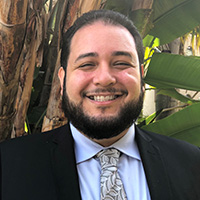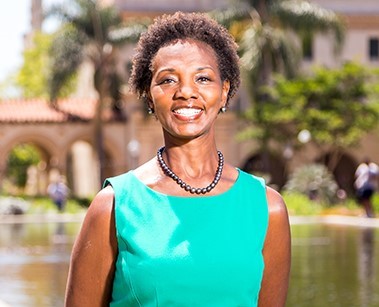
By Elijah T. Gaglio
Aguirre & Severson LLP
 Judge Randa Trapp is a San Diego trailblazer who has permanently changed the legal community for the better.
Judge Randa Trapp is a San Diego trailblazer who has permanently changed the legal community for the better.
Trapp joined the bench in 2003 as San Diego Superior Court’s third-ever African American female judge. She recently retired from the bench after 18 years of service and was honored with the SDCBA’s Outstanding Jurist Award last month.
“As I reflect back over my 35-plus year career in the law, I still have to pinch myself, for the odds were stacked against me, a little black girl from southeastern San Diego raised in National City, from truly humble beginnings,” Judge Trapp said in her award acceptance speech.
“Truly Humble Beginnings”
Judge Trapp’s commitment to fighting social injustice began early in her life. While attending Lincoln High School in southeastern San Diego, she participated in a walk-out to bring adequate resources and a better education for the students at her school.
Judge Trapp attributes her strength as a young advocate to her parents, who moved from Texas to California in search of a better life. She remembers her father was forced to quit school in third grade to pick cotton, and her mother had an eleventh grade education. Her parents’ sheer determination to improve their lives inspired her to have that same type of resilience.

“So many people made huge sacrifices — including sometimes their own lives — to bring changes I benefited from,” she said. “I feel I owe a debt to society to give back and continue to bring change.”
Growing up, Judge Trapp did not have professional role models to help her navigate her career after high school. After taking a break from college to spend time with family, Judge Trapp enlisted in the Navy with the help and encouragement of a neighbor who took great pride in his Naval career.
During her five years of active-duty service, Judge Trapp learned quite a few lessons; one in particular was developing a strong discipline which has “proved invaluable in everything I have done.” Judge Trapp was invigorated by President Harry Truman’s Executive Order, which aimed to create equality of treatment and opportunity for all persons in the armed services without regard to race, color, religion, or national origin. She felt although the military still had a ways to go in terms of racial and gender equality, the Executive Order gave her “an extra boost of confidence because I was in an organization where I was going to be judged by my discipline and merit.”
Reflecting back, Judge Trapp believes she made the right decision to take a break from college and serve in the Navy because it provided her the opportunity to mature, the ability to be productive at an early age, and the clarity she needed to continue pursuing her education.
From Lawyer, to Judge, to Mediator
Judge Trapp ultimately obtained her bachelor’s degree from San Jose State University and her law degree from Georgetown University. She started her legal career in 1985 with the California Attorney General’s Office, after which she worked in private practice and then as corporate counsel for Sempra Energy, the company that owns SDG&E.
Judge Trapp was then appointed to the bench in 2003. While on the bench, she continued to give back to the legal community as Chair for the Civil Law Curriculum Committee of the Center for Judicial Education and Research, where she developed a course on implicit bias used to train new judges. She also served as supervising judge for the San Diego Superior Court civil division prior to her retirement from the bench last March.
In her retirement, Judge Trapp still actively contributes to the profession as a neutral for JAMS. She is smoothly transitioning into her new role as a JAMS neutral due to her nearly two decades of experience as a judge. She appreciates the additional training provided by JAMs because it gave her new tools on how to resolve disputes.
She advises new attorneys attending mediation to prepare at the same level as a dispositive motion or trial. Successful attorneys prepare their clients for mediation by managing expectations and explaining the differences between mediation and trial: “If everyone walks away a little unhappy then it is a successful mediation. If you do it right, the case should settle and you saved the client money and time.”
A common theme throughout Judge Trapp’s career is her dedication to improving race relations in the legal profession and the San Diego community, as former president of the San Diego Chapter of the NAACP, former president of the Earl B. Gilliam Bar Association, and a former board member for both the Lawyers Club of San Diego and the California Association of Black Lawyers.
She advises new lawyers to strike the right balance between dedicating yourself to your craft and giving back to your community, while emphasizing the value of even 2-3 hours per week spent supporting the community.
“With a juris doctorate you immediately have credibility,” she said. “If you have an interest in a particular area, people will welcome your involvement and will likely want you to be a leader.”
Judge Trapp also advises that with power comes responsibility: “You always have an opportunity to do the right thing. When you are in a position to make a decision, remember everyone is equal and take that into consideration.”
Although COVID-19 has impacted the ability to volunteer in person, Judge Trapp points out there is no shortage of virtual volunteer opportunities. At the same time, as California begins to safely reopen, Judge Trapp urges lawyers to not underestimate the advantage of attending meetings and events in person, in particular lawyers of color, women, and all those who have historically been invisible and have had to fight extremely hard to be seen.
“We are a country that still struggles with racial equality. It is my hope as we focus on service to the profession and to the community, that we can move past that which separates us and celebrate the humanity that dwells within each of us.”